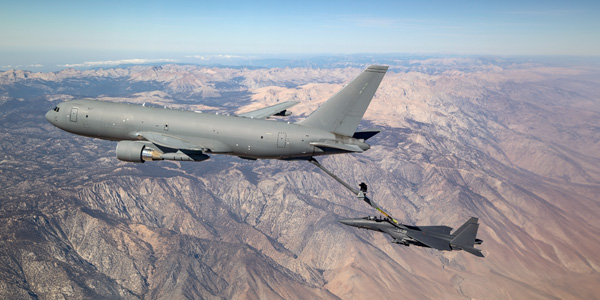
Photo: Courtesy of Boeing.
Following 32 years of U.S. Department of Defense experience and more than a decade spent on security cooperation, I am more confident than ever that innovation, allied by design, and global partnerships are key to preserving peace. I would like to share an industry perspective to this year’s theme of moving into the future with transformational insights.

Heidi Grant, President, Business Development, Defense, Space & Security Global Services.
World events have been telling for the fragility of global peace and security and is a stark reminder that stability in the Middle East matters internationally. The strengthening of the world’s security environment will require the collective effort of nations, partners and industry to get a better understanding of what is needed to enhance partnerships, integration, and operability.
Mission readiness is not a job that any one government or one company can accomplish alone. Similar to the operational strength we experience when military coalitions work together, we must bring together the best of our global industries and combine our strengths to provide the innovation, technological advances and mission readiness that will enhance our global security.
There are also capability gaps across all domains and there is a lot of work to do, but recent, strong commitments to focus on defense and ongoing efforts to accelerate acquisitions is a welcomed and important step forward.
Industry’s Contribution to Global Security
Acquiring capability alone is not enough. From my Boeing industry lens, I’d like to highlight three areas in which Boeing and our industry partners can best contribute to global security and stability:
The first is innovation.
Innovation is the best defense in today’s security environment. If there is one thing we learned from the pandemic, it is that innovation, partnerships, and a stable supply chain are the only way we will survive in a contested environment.
Our warfighters often take our technology and use it in ways that it was not originally designed for, which emphasizes the importance of communication and collaboration between government and industry to exploit the full spectrum of capabilities we have for global security.
Boeing’s investment in autonomy to enable decisive, mission advantages for its customers.is a strong nod to the future of warfare. Autonomy is key to winning the future fight, not with a singular new aircraft or weapon, but rather a mix of autonomous technology platforms, working together seamlessly in a battlespace with multiple players.
Further, we are making great strides in advanced modeling and simulation in contested environments, where we can see how air, land, sea and space systems will work together in simulated environments to achieve mission success.
We’re also adopting digital technologies to increase mission readiness and save costs.
The second is Allied by Design.
With technology, we have a tremendous opportunity to drive operational advantages, usefulness, and resiliency for our armed forces by ensuring we have dependable supply chains, advanced applied technologies, integrated by design – or as I refer to “allied by design” — with exportability considered from the beginning, offered at the speed of relevance with a clear and agile acquisition process that get capability into the hands of the people who need it most.
Last year, U.S. Secretary of Defense Lloyd Austin tasked a tiger team to look into how to improve the Foreign Military Sales process. There were a variety of recommendations. Industry is fully engaged and watching this carefully to ensure that we have production capacity and surge capability, when and if joint and coalition warfighters need it.
We know our military partners need to operate with urgency and speed due to rapidly evolving threats– it is our priority to meet your timelines. The threat requires us to accelerate delivery of critical capabilities to the warfighter, be proactive, and ensure that we remain technologically dominant in today’s world.
That may mean replacing current aircraft with more efficient options, scaling the development and production of sustainable aviation fuels and leveraging data and digital tools where possible to streamline costs and accelerate learning and training.
We are moving much faster with digital design and production, by using a digital thread that decreases rework, maximizes first time quality and eliminates duplication in design, analysis, test and sustainment. To me, the more sustainable, lower cost, energy efficient we become, regardless of the business, will lead to more effective operations.
The same goes for our supply chains. We need durable supply chains that are stable, predictable, efficient and global.
Beyond sustainability, there are a whole host of areas where collaboration among allies and partners and fortifying our relationships will pay dividends in global security and future proofing a modern alliance.
With shifting global security, and an age of heightened strategic competition, allied by design allows U.S. industry to scale up and meet growing global demand among allies and partners now and in the future.
The third is commitment to global partnerships
Simply stated, we cannot do this alone. It is the close collaboration between industry and government that will empower transformative gains in key areas, ensuring collective security, sustainable resilience, and success.
For nearly half a century, as a global company, Boeing has worked with more than 40 countries around the world to successfully complete industrial engagement programs.
These programs have delivered significant benefits to economies and communities by establishing aerospace and defense supply chains and services infrastructure, creating jobs and enabling prosperity.
With global sustainment, we need the right parts and right materials in the right places so teams can do necessary sustainment work.
We’ve partnered with the military services and government to accelerate production of capabilities relying on our global suppliers so we could be a production accelerator.
Those areas will require our collective willingness and ability to make the necessary investments in developing the capabilities we need, and moving at an accelerated pace, which has its ups and downs when working across so many different sovereign nations and departments like the government, private industry, the military, and academia.
Together with our defense industry partners, we have the best equipment, the best technology, the best people, and of course unmatched ingenuity. When the defense industry combines our capabilities with our partners and Allies, we are unstoppable.
The obstacles we face as independent nations are not impossible when we solve them together. Global security requires us to move into the future, with transformational insights driven by Innovation, Allied By Design, and Commitment to Global Partnerships.
About the author: Heidi Grant is president of Business Development, where she leads a team of nearly 500 people in 25 states and 16 countries representing the company’s defense, space and government services portfolios. Her organization develops and maintains customer relationships that align Boeing’s products and services with customer mission requirements, capturing new business and achieving business growth.
Grant joined Boeing in 2021 from the U.S. Department of Defense, having served as director, Defense Security Cooperation Agency, responsible for all DOD security cooperation programs involving defense articles, military training and other defense-related services. She oversaw more than 15,000 military sales cases with more than 150 countries valued at more than $600 billion. Grant was also director of Defense Technology Security Administration, responsible for developing and implementing global technology security policies for international transfer of defense-related goods, services and technologies.








